Digger Aaron Robinson: A burner phone, his wits and nine days to do the impossible in Afghanistan
Armed with a burner phone and his wits, Aaron Robinson helped rescue hundreds of people from Kabul and then disappeared. Two years later, those he saved finally got to say ‘thank you’.
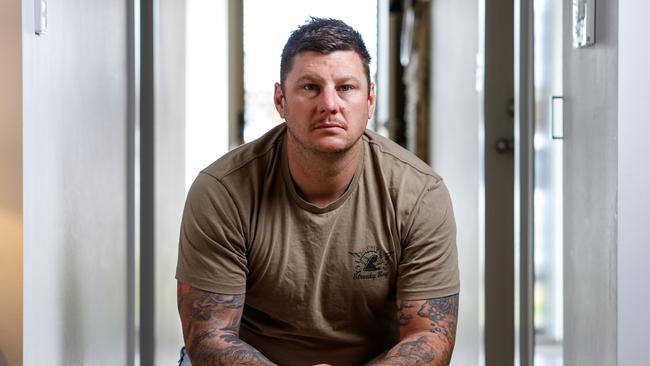
Amid the chaos he witnessed for those nine days at Kabul airport, the women crushed underfoot like dried autumn leaves, the people huddled in the shade cast by a mound of dead bodies, the mothers thrusting babies over barbed wire to reluctant soldiers, it is the whiteboard moment that still tugs at him.
The overburdened mind will sometimes reach for the smallest things.
Aaron Robinson shakes his head as he describes those blurred days of August 2021, the young corporal barricaded inside Afghanistan’s Hamid Karzai International Airport with hundreds of troops from more than 20 countries in one of the world’s most extraordinary rescue missions.
Outside, it felt as though Kabul’s four million residents were at the airport gates, begging to be taken somewhere, anywhere, as far as possible from the Taliban, which had recently captured the capital with a swiftness that surprised many. “There was constant gunfire, people being shot, people being trampled, people just so desperate to leave. It was chaos,’’ Robinson recalls.
Inside the airport, things were frantic as the Australian military team realised this was a far bigger exercise than anything they had imagined. Early attempts at formal lists or established systems to guide an orderly exodus soon gave way to hundreds of names scribbled on whiteboards and citizens waving their Australian passports, visa paperwork or Aussie flags, in the hope they would be noticed among the pleading masses gathered at the gates.
Armed with a burner phone and his wits, over the course of those nine days RAAF Corporal Robinson helped guide Paralympians and female soccer players from the crowd and extract families with infants from an excrement-filled drain that became central to the rescue effort.
He became known as the mystery corporal phoning people on the run, calmly directing them where to go, what to do and liaising with a network of civilians in Australia to get approved evacuees out alive when all hope seemed lost.
There were many heroic acts during that tumultuous mission as Australian Defence Force and Department of Foreign Affairs personnel evacuated 4100 people on 32 emergency flights, yet the Aussie corporal and his burner phone took on a legendary status among the rescue network he assisted.
“He didn’t give up,’’ says Sydney human rights lawyer Alison Battisson, a tough-as-nails former boxer who recalls Robinson’s intervention as the turning point that allowed her small group to help rescue at least 110 people, mostly female athletes facing retribution from the Taliban.
As the narrow window for evacuations closed and the Australian contingent was ordered out amid warnings of an imminent terrorist attack, an exhausted Robinson had no choice but to give up.
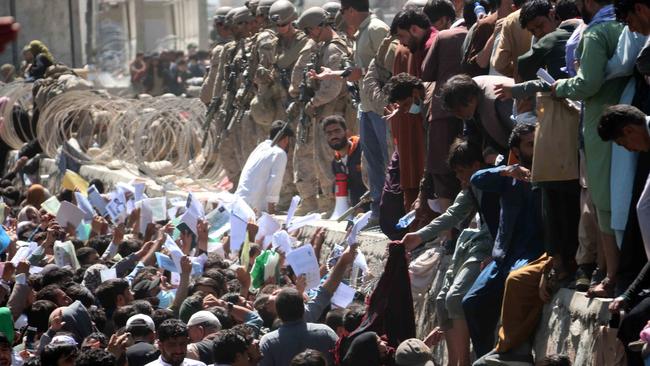
Before he left, he had one final task … a simple job, probably the easiest thing he had to do over those nine days.
“When that last flight was full, and we couldn’t take anyone else, we had to rub all the names off the whiteboards. We still had four or five whiteboards full of names,’’ he pauses. “That was probably the hardest thing I’ve ever had to do. They were just names on whiteboards but we knew they were people who were still out there.’’
Hours after that last Australian flight, an ISIS-K suicide bomber killed 13 US military personnel and more than 150 Afghans waiting in the crowd, some of whose names were almost certainly scribbled on those whiteboards.
The fall of Kabul and the massive evacuation effort has been told through the stories of survivors and those left behind, and through the civilians on the other side of the world who guided Afghans in need of protection out of their own city.
Female athletes, educated women and those who had supported the Australian military during the war were at particular risk under the new regime.
Yet as with many military missions, the actions of our Diggers, and the ongoing impact on them, have rarely seen the light.
Battisson didn’t want Robinson’s actions to be forgotten.
She wrote to the chief of the air force recommending that he be given special recognition in a letter supported by other heavy hitters in her network, including former US marine and Afghan soccer coach Haley Carter and Kelly Lindsey, the former head coach of the Afghan women’s soccer team.
As far as they were concerned, Robinson went above and beyond.
“(He) helped extract a significant number of people from the Abbey Gate and the drainage system by the Abbey Gate [at the airport]. Included in these people were women, children and infants. Significantly, a large number were female athletes and their families,’’ they wrote.
“Corporal Robinson deserves recognition for his role in saving these people.’’
Ongoing trauma
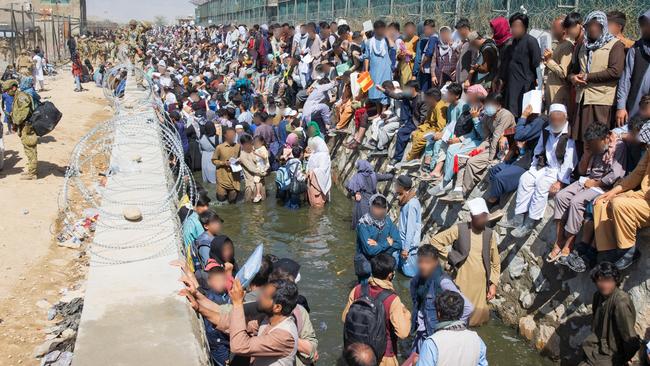
Battisson sent off the letter but she never heard anything back.
She would scan Australia Day and Queen’s birthday honours lists expecting to see his name among those who were awarded for bravery and gallantry in Kabul.
“Whether or not other people there were doing amazing things, which I’m sure they were, Aaron deserves to be recognised for what he did alone. It is outrageous it hasn’t happened yet,’’ Battisson says.
Robinson, back in Australia and struggling with post traumatic stress disorder, received an internal gold commendation from his boss on the ground, rungs below the recognition Battisson and her network believe he deserves. It acknowledged that he’d performed under acute pressure and severe fatigue to protect Australian officials while retrieving evacuees from riotous crowds under threat of enemy attack.
And it noted the instrumental role he’d played in creating a “recovery cell that was without precedent’’ to co-ordinate evacuations.
“I don’t think people realise, and I don’t think his children realise, just what Aaron did and the effect it’s had on him,’’ Battisson says.
“That’s what gets me – their dad is a hero but he has been made ill because of it.’’
Townsville-based Liberal MP and Afghanistan veteran Phillip Thompson knows of others dealing with ongoing trauma from the deployment, the heavy price some paid for extreme acts of bravery.
He has spent the past couple of years fighting for greater recognition for all the military men and women who took part, pushing the federal government to bestow “appropriate battle honours’’ to highlight the unique operation conducted in the most hazardous and chaotic circumstances.
“I’ve spoken with the minister, he knows my position, and I think that he needs to move quickly to acknowledge the sacrifice of these brave men and women,’’ Thompson said.
Karate family
From his home north of Adelaide, Robinson, 36, has agreed to speak about his experience, not because he is claiming some sort of hero status or seeking recognition – “It wasn’t just me, it was a team effort’’ – but because The Weekend Australian has contacted him.
He was the missing piece of an award-winning 2021 story on the extraordinary evacuation of a group known as the Karate family, the father *Ehmad and his karate champion wife, their three children (the youngest aged just two) and a nephew, all at extreme risk of Taliban persecution.

Of all the people Battisson and her group helped guide out of Kabul, the most dramatic evacuation was of this one family who day after day battled to make it to the airport only to get shot at, bashed, crushed or pepper-sprayed. They spent hours in the excrement-laced drain outside the airport, their baby dehydrated and losing consciousness as they forlornly held hastily prepared “AUS” signs, just as Robinson had instructed them to do.
By this time, Robinson was fielding hundreds of calls in a race against time to locate people and get them out of the country before the Taliban’s August 31 deadline for foreign troops to leave.
Ehmad messaged him from the ditch after days of trying to access the airport: “Please send someone.”
“I am trying, mate,’’ Robinson replied.
“Very very hot weather, kids are suffering.”
“I know mate, please hang in there. I am in the process of trying to get you out.”
After more than four hours in the water: “Please sir. My daughter is very little …’’
When the family finally made it into the airport and looked likely to be refused entry to Australia because of a misunderstanding, Robinson messaged Battisson: “Ali, I will go and get them myself. Calls have been made. This family will get to Australia.”
Weeks later, safe in Sydney, Ehmad told The Weekend Australian: “We were blind. We were in our own country but someone else was guiding us. I didn’t know them. But how they helped me; they weren’t even sleeping … They proved that humanity still exists.”
As they settled in to their new life, the Karate family wanted to meet the corporal but did not know his name or how to find him. “For us, he was the angel who saved our lives,’’ Ehmad says.
Robinson was not identified by name in that cover story in The Weekend Australian Magazine and the ADF did not respond to our request for an interview with him.
Readers, however, were intrigued: “The corporal deserves to be recognised and publicly commended for his work,’’ said one.
“If we can rescue a family from the other side of the world we should be able to find and recognise the corporal,’’ said another.
Days of desperation
Now medically separated from the RAAF and being treated for PTSD, Robinson says he was unaware of the attempts to contact him.
He’s happy to talk about his role in one of the biggest humanitarian evacuations ever completed by the ADF and, despite the personal price he speaks with pride at what was achieved under impossible circumstances. “I don’t regret anything. It was a massive thing to be able to actually help people and make a difference,’’ he says.
Since signing up as a 19-year-old air force defence guard, he’d trained in evacuations and close combat. He’d served in Kandahar and the Middle East doing aircraft security during the Afghanistan war and was accustomed to hair-trigger situations but this was something else entirely. Robinson and a fellow corporal were dispatched early from No. 3 Security Forces Squadron in the Middle East, arriving soon after the world flinched as Taliban fighters rolled into Kabul.
The sheer terror gripping the city was broadcast in harrowing footage of citizens clinging to a military plane and plunging to their deaths during takeoff.
“I was assigned originally to just be on the aircraft to do security. And then they needed more people on the ground because they only had a small team at the time.’’
The initial list of approximately 500 people eligible to be evacuated by the Australians soon blew out to “a much greater number than initially thought possible”, according to the ADF. It was a messy end to Australia’s 20-year involvement in Afghanistan that cost 41 ADF members their lives and sent many more home with injuries and lifelong trauma.
“The first four days was just like, literally, running out and grabbing people and pulling them back through the chaos. But every time we did that, the crowd would start swarming and it became too dangerous,’’ Robinson says.
Looking at the children being crushed, at babies being handed to soldiers for safety or as parents rushed back to get the rest of the family, he couldn’t help but think of his own three young boys safe at home with their mother, Hayley, in Australia.
“It was unbelievable, just seeing the desperation and what people were willing to do to leave. People were collapsing and dying and the crowd would just step over them,’’ Robinson says.
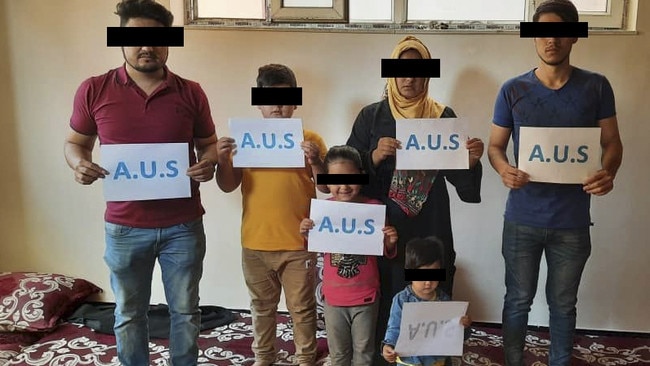
Taliban fighters were among the crowd, shooting at and beating up citizens. “Usually you wouldn’t tolerate anything like that but we just had to watch. You couldn’t run out and save these people because you’d end up sparking an incident,’’ he says.
As more Australian troops arrived, Robinson pulled back with his burner phone to try to co-ordinate activities and guide evacuees to the airport and through the crowd, where they could be spotted by troops manning the gates.
There were hard decisions to be made; people who didn’t have the correct paperwork had to be turned away. He tried not to take it personally when some rang him in despair: “My family’s dead now because of you. You left me to die.’’
Says Battisson: “Aaron was on the frontline, not only doing his military duties but liaising and organising, which is normally a split task.
“It wasn’t like anything was being filtered through his superiors. He was directly dealing with civilians from Australia and around the world all messaging him on this burner phone to get the people they were interested in out of the country.
“In my mind, he saved every single person’s life that he managed to pull into the airport in incredibly difficult circumstances.’’
Mood shifts
After that final flight out, Robinson was exhausted: “I think I broke down at the end of it. I was done. I hadn’t slept much the whole time and we didn’t eat a lot and didn’t have much water.’’


There was a lot to process and something within him had changed.
Months later, back in Australia and working as a recruit instructor, he realised he wasn’t coping. He would unload on people who weren’t trying hard enough, would lose his temper easily. Having seen people fight so hard to live, he had lost perspective in his daily life.
“My mood was changing and I was just not a happy person. I was a wreck,’’ he says.
Robinson says he is getting the help he needs for his PTSD and is enjoying busy time at home with his RAAF wife and their three boys, a seven-year-old and twin four-year-olds.
Aftermath
It is unknown how many of the 147 ADF personnel deployed to Kabul airport have been treated for ongoing trauma in the aftermath but the ADF says it has not detected an increase in medical separations for the force. Figures from the US suggest some 41 per cent of veterans involved in the evacuation were still suffering PTSD and moral injury a year later.
Northern Territory Labor MP and retired army officer Luke Gosling told parliament of conversations he’d had with some of the soldiers on the ground.

One said: “We also had the heartbreak of having to tell family members that although some of them qualified to come to Australia, other family members did not. Some of those family members begged us to shoot them then and there rather than go back outside the gates to the Taliban.
“All of this has left a big hole in our hearts and a large moral injury on the young men and women that served in Kabul.”
More than 400 ADF and civilian personnel who supported the airlift received the Australian Operational Service Medal but Thompson says a special battle honour or citation should be bestowed upon members of his former 1RAR battalion and other attachments who served so valiantly in Kabul.
Connections
As Robinson adjusted to civilian life, his mind kept turning to the people he had rescued. Last year, he sent Battisson a message. “She rang straight back and said, ‘Oh my God, we’ve been trying to find you!’ ’’ he says.
She invited him to Sydney and messaged Ehmad with the news. “We were surprised and very happy,’’ Ehmad told The Weekend Australian. “I said it is the time to end this debt and say thank you to this beautiful human being.’’
Fatima Yousufi, the former captain of the Afghan women’s soccer team, was there. Her younger sister Bibi, then 18, and brother Ali, 16, were the last of Battisson’s group to be plucked from the ditch with the help of Robinson.
What was that meeting like? “It was surreal,’’ says Robinson. “It was so good to meet them, and particularly to see the kids settling so well into Australia. It helped.’’
Says Battisson: “I felt like it was the beginning of something new.
“It was like a family of distant cousins all coming together and realising they would always be connected. And that this man had given all these people a new trajectory on life. And life.’’

Ehmad simply walked up to Robinson and hugged him.
“Thank you,’’ he said. “Thank you.’’
“I told my wife, look how amazing and generous this family is. He has got a family, a lovely wife and three beautiful children but still put his life in danger and came out to the airport to help us,’’ Ehmad says.
“These kinds of beautiful human beings should be remembered and praised for their love to humanity.’’
*Name has been changed.



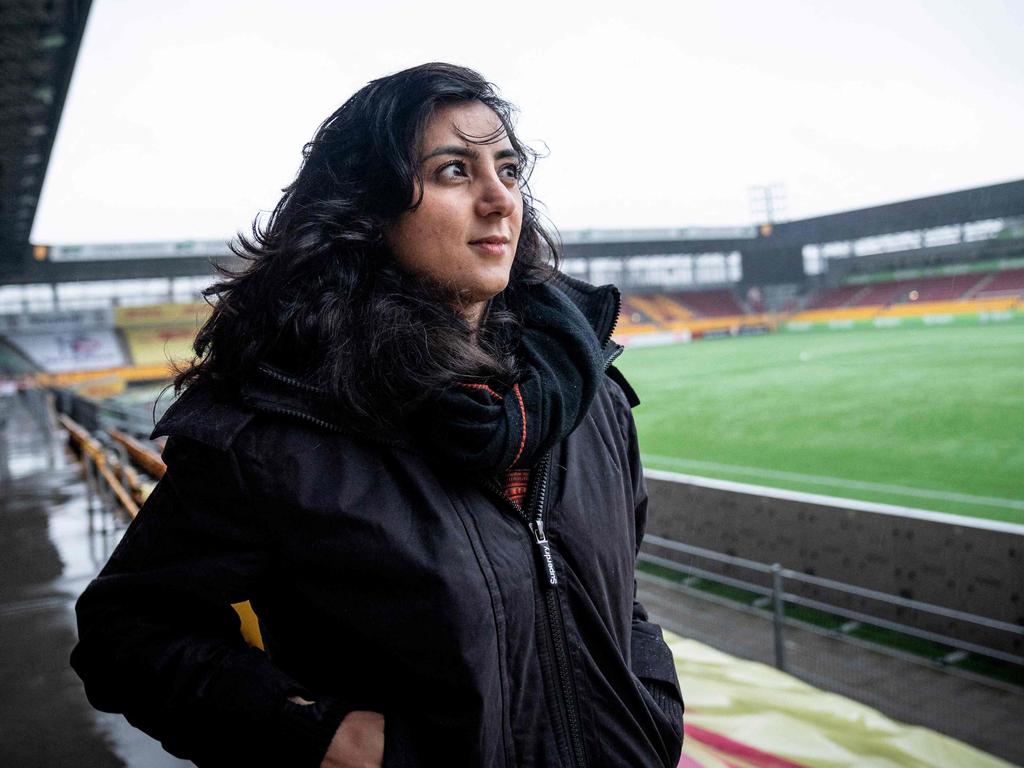
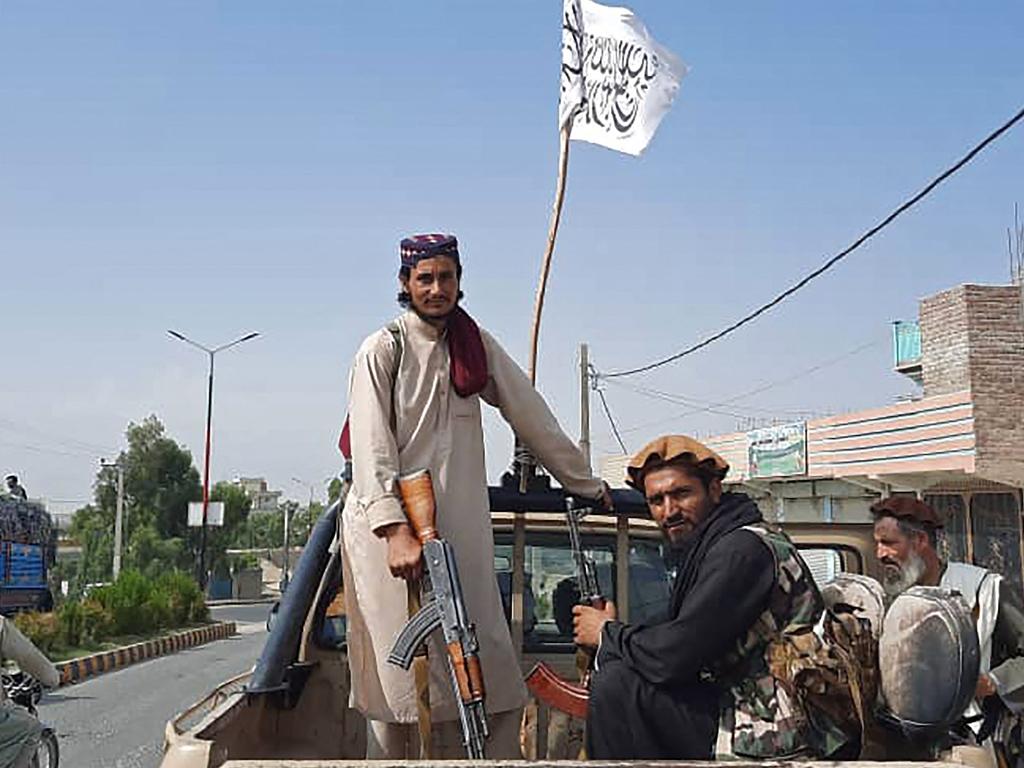
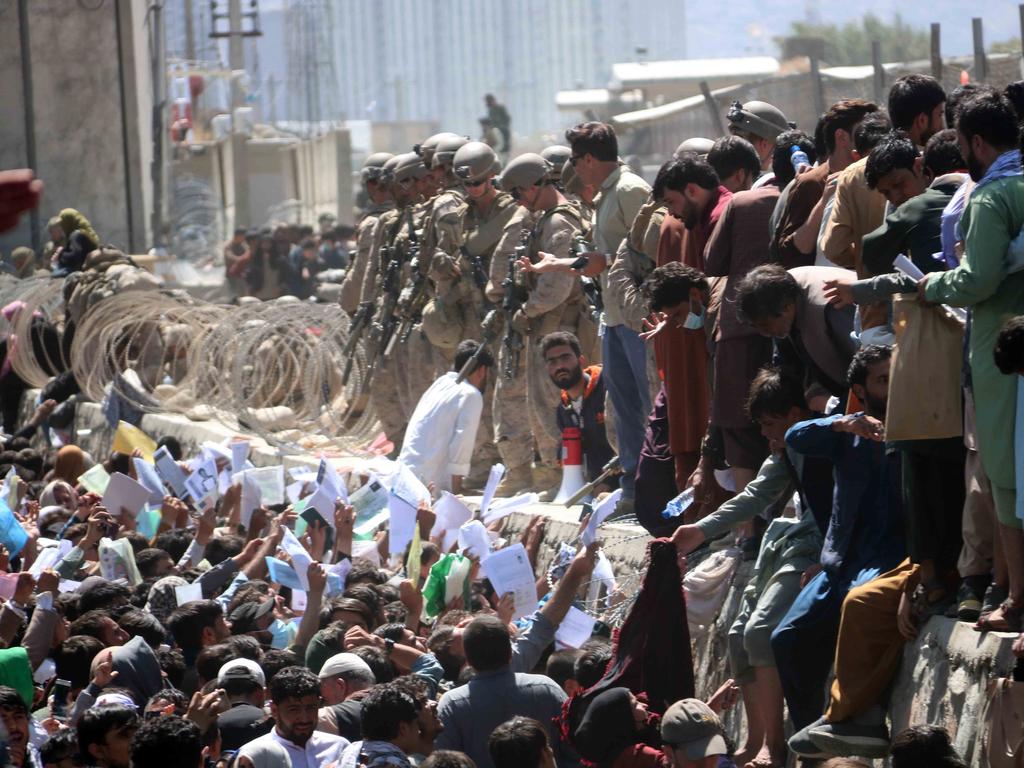
To join the conversation, please log in. Don't have an account? Register
Join the conversation, you are commenting as Logout